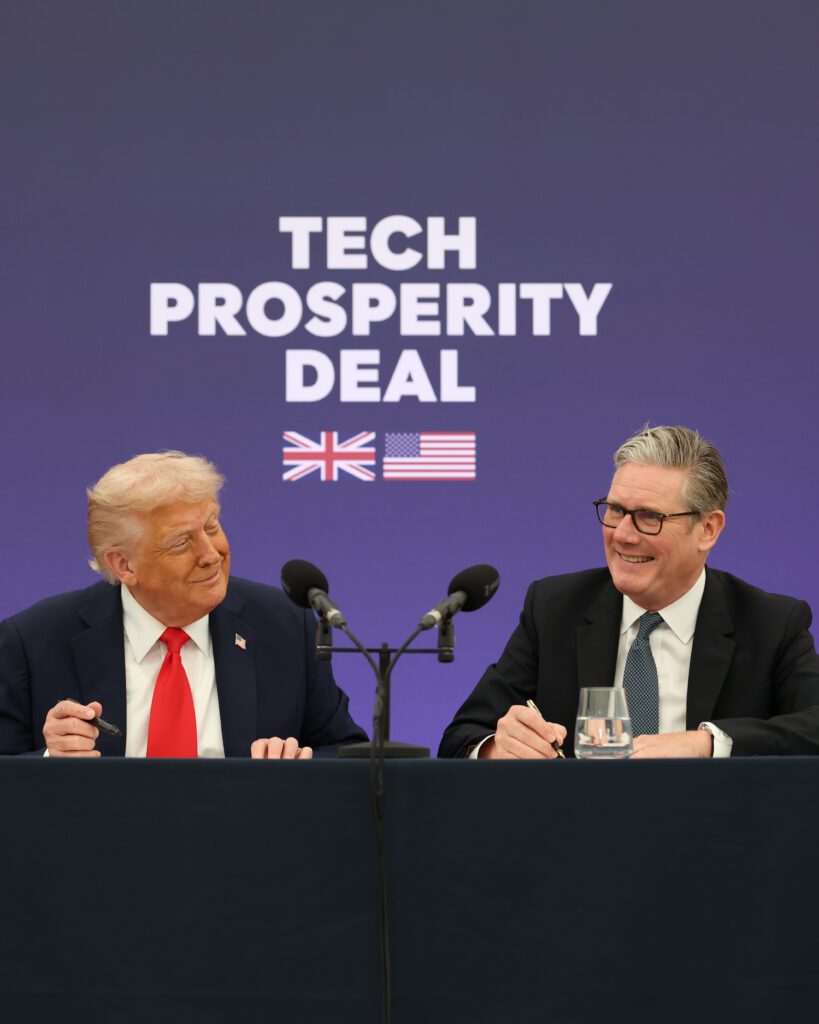Yesterday, US President Donald Trump and British Prime Minister Keir Starmer signed a new technology agreement that aims to establish the UK as a world leader in artificial intelligence, quantum computing, and nuclear technology.
The Tech Prosperity Deal is one of the largest bilateral technology partnerships in recent times, and will see more than £30 billion invested into Britain by American companies.
Key elements of the agreement include the opening of a new Google data centre in Hertfordshire, Salesforce investing an additional £2 billion into its UK operations, and a £500 million investment from asset management firm BlackRock into tech infrastructure.
But by far the most significant part of this deal is Microsoft’s commitment to invest more than £20 billion in AI infrastructure and operations across Britain, including the construction of the country’s biggest supercomputer. This marks Microsoft’s largest-ever investment in the UK, with CEO Satya Nadella saying the company is committed to ‘ensuring America remains a trusted and reliable tech partner of the United Kingdom.’
Meanwhile, Nvidia chief executive and co-founder Jensen Huang, whose company has agreed to deploy 120,000 advanced GPUs across Britain, said that ‘the UK is going to be an AI superpower,’ and that the British people were ‘too humble’ to know it.

If Huang’s prediction is correct, it will be welcome news for a British government desperate to revitalise an economy that lacked any meaningful growth since the 2008 Financial Crisis.
The deal is projected to create thousands of high-skilled jobs, particularly in the north-east of England, currently one of the country’s poorest regions, which will allegedly be transformed into an AI Growth Zone.
As well as economic benefits, the new deal could have a major impact on the currently-struggling NHS, with the government saying that the new UK-US partnership in quantum computing could lead to the development of ground-breaking new medical technologies and processes, that will enable people to be treated ‘in a fraction of the time and cost it takes today.’
Furthermore, a new deal on nuclear energy that was announced on Monday will see increased collaboration between the two countries on safety regulation, a new partnership on nuclear fusion research, and a number of commercial deals between British and American companies that, according to the government, will usher in a new ‘golden age’ of nuclear energy.
Whilst both deals are certainly a victory for Keir Starmer and his government, with the potential to put the UK at the forefront of the AI revolution and stimulate serious economic growth, it is difficult to shake the feeling that the technology agreement could have been bigger and better than it has turned out.
The Prime Minister said that the American investments were ‘a testament to Britain’s economic strength,’ however a number of other firms clearly disagree and thus have opted against investing in the UK; pharmaceutical company Merck has abandoned a planned £1 billion investment, claiming that numerous successive British governments have failed to properly support medical innovation, whilst AstraZeneca has halted its plans to invest £200 million into a site in Cambridgeshire.
Furthermore, whilst the government boasted that the Tech Prosperity Deal will create 7,600 jobs across the UK, they did not caveat this by adding that the job market is slowing, with the period from June to August 2025 seeing 100,000 less job vacancies posted than in the same period last year.
Additionally, there is potentially a risk that these agreements could compromise the UK’s national sovereignty. With so much foreign capital to be invested, will the British government be able to maintain control over the country’s technology and energy sectors? There are plenty of people on both sides of the Atlantic who already describe Britain as an American vassal state, and this deal may do little to change their minds.
Nevertheless, the deals do show that the British and American governments are able to brush diplomatic controversies and politics aside for their own mutual economic good.
The agreements come at a turbulent time for the so-called ‘special relationship; last week the British Ambassador to the US Peter Mandelson was fired after new messages to convicted paedophile and former associate of President Trump ,Jeffrey Epstein, were unveiled, whilst in August the US State Department accused the UK of ‘significant human rights issues’ over free speech.
Such diplomatic tensions were visible during Thursday’s joint press conference at Chequers, such as when President Trump stated that he disagreed with the UK’s decision to recognise a Palestinian state and advising the Prime Minister to use the British military to counter illegal immigration. However, for most of the conference the two men were full of praise for one another, with Trump adding that he had ‘few disagreements’ with Starmer and even patting him on the back at one point (something that may do little to dismiss the vassal state allegations).
Nevertheless, despite valid concerns about national sovereignty and the inescapable feeling that some opportunities were missed, the British government are likely to be pleased with their work this week. Whilst some firms may not see the vision, it appears evident that some of the world’s biggest technology companies have faith in Keir Starmer and his Cabinet, and truly believe that Britain has the potential to become a world leader in artificial intelligence. Whilst it remains to be seen whether or not Britain can reach that potential, the Tech Prosperity Deal is certainly a step in the right direction.

